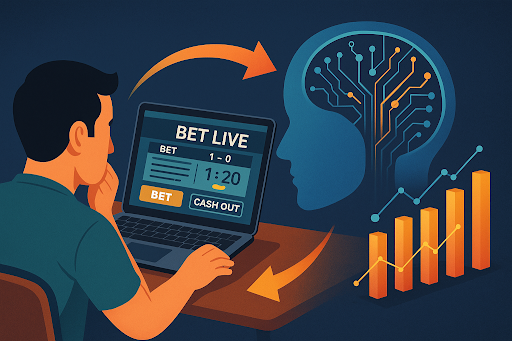You might have seen that sports betting is now more technical and driven by data than in the past. While punters engross themselves in prediction apps and spreadsheets, bookmakers have moved on to what’s next. They’re now using machine learning to play a new game. This game focuses more on your behavior than on events. Have you ever thought about that?
They’re not predicting matches anymore. They’re predicting you, or people like you. They want to maximize their profits while doing it. Platforms like 22Bet login prove how AI-driven betting tech tailors the experience. It looks at every click and wager to guess what you’ll do next.
How? Let’s take a look.
Bookmakers: No Longer Pricing Events, But Predicting People
Back in the day, bookies priced events.
Traditional Odds-Making Isn’t Dead — It’s Evolved
Flutter connects this to “safer gambling.” These insights can also help with pricing models and marketing options.
The odds on your screen don’t show the true game probabilities, whether before or during the match. Instead, they reflect what people like you usually do in those situations.
Punter’s Behaviour Shapes the Lines
Just to be clear, bookmakers are still using traditional factors to set odds. These include injuries, league position, historical performance, and expected goals.
But here’s the shift..
Before kickoff, the initial line often shifts based on how the market behaves as a whole. If a sharp group bets heavily on the draw at 3.20, the price may shorten to 3.00. If casual bettors support the favorite, the bookie may keep the odds steady. They might also cut them less than expected. They think more bets will come in.
Machine learning helps bookies find betting patterns that differ from expectations. This helps them respond in real time. It’s not to protect their margins; it’s to see how punters react to information.
Once the game starts, the focus shifts from market trends to individual behavior. In-play odds change all the time. They don’t depend on what happens on the pitch. They also rely on how you and other bettors reacted to similar situations before.
Did you hesitate last time your team went down 0–1? Do you often place a wager on the second half to recover from an earlier loss? The algorithm remembers. In this phase, the bookmaker’s model becomes more reactive—not to the match alone, but to you in the match.
The Data You Feed the Machine: Every Click is a Signal
Researchers train machine learning models on years of betting data. Systems analyze millions of data points. They track how often you check your slip, change your stake, or cash out early. These systems learn to predict your actions before you even realize them. Bookmakers call it risk management. But if you’re not aware of it, it becomes risk extraction.
Your Behaviour Becomes a Product
You probably think your betting data is your bet history. It’s not. That’s the final action.
What the machine cares about is everything leading up to it:
- How long do you scroll?
- Which matches you click on but don’t bet on.
- Which odds make you hesitate?
- How often do you change your mind?
- How quickly you cash out when things get uncomfortable.
Machine learning systems turn these little signals into numbers. Feature engineering is a key part of making machine learning work well in sports betting. It’s how raw clicks become predictive insights.
It’s not a guess. It’s data.
Behavioural Insights or Behavioural Exploitation?
This data doesn’t sit on a server. It’s fed into predictive systems — systems that update in real time.
Let’s say you cash out early three times in a row during tight games. Next time you’re in a similar match, the system may offer a lower cash-out sooner. It knows you might accept it.
Real-Time Odds Are Not About the Game – They’re About You
Now, let’s talk about live betting. It feels electric, right? Fast-paced. Reactive. Like you’re ahead of the curve.
The Odds Are Reacting to You
And even if the odds look unchanged, there’s more going on. Bookmakers test the waters. They’ll likely float a less generous price for a few hundred milliseconds to see if people still take it. We call this quote testing. If you bite, it stays. If not, it reverts. It’s behavioral pressure testing.
In this phase, machine learning algorithms simulate how you might react. They look at odds, timing, volatility, and emotional pressure.
Bookmakers know your risk and loss tolerance better than you think. And they can exploit it by offering a payout slightly below fair value at the right emotional moment.
Your only defense? Stop betting on reaction. You’re playing a game where the dealer knows your hand before you do.
The Moral of the Story: Stop Thinking Like a Gambler
Start Thinking Like a Market Analyst. This doesn’t mean becoming a spreadsheet guru. It means building habits that resist emotional traps.
What does a gambler do?
- Opens the app on instinct.
- Follows a gut feeling.
- Scrolls until something “looks good.”
- Doubles down when frustrated.
That behavior is not unprofitable. It’s predictable. And so valuable.
What does a market analyst do?
- Place bets before opening the app.
- Sets fixed rules on value and price thresholds.
- Records not only wins and losses, but also the reasons behind decisions made.
This isn’t about becoming a spreadsheet wizard. It’s about becoming unreadable to the algorithm. It’s about removing your predictability.
Because when the model can’t model you, the bookmaker’s edge disappears.
And here’s the thing: You don’t need their tools. You don’t need to build your own AI.
You just need to:
- Bet less frequently.
- Think more critically.
- Make fewer emotional decisions.
- Track your own data better than they do.
So next time you feel the urge to bet on instinct, pause. You don’t have to battle machine learning with more machine learning. But you must grasp how the system represents you.
Ask yourself: Who benefits from this impulse? Who has already predicted it?
Chances are that the model has already logged the move you are about to make.
The offer I sent you is final and non Newsbreak Blog.

